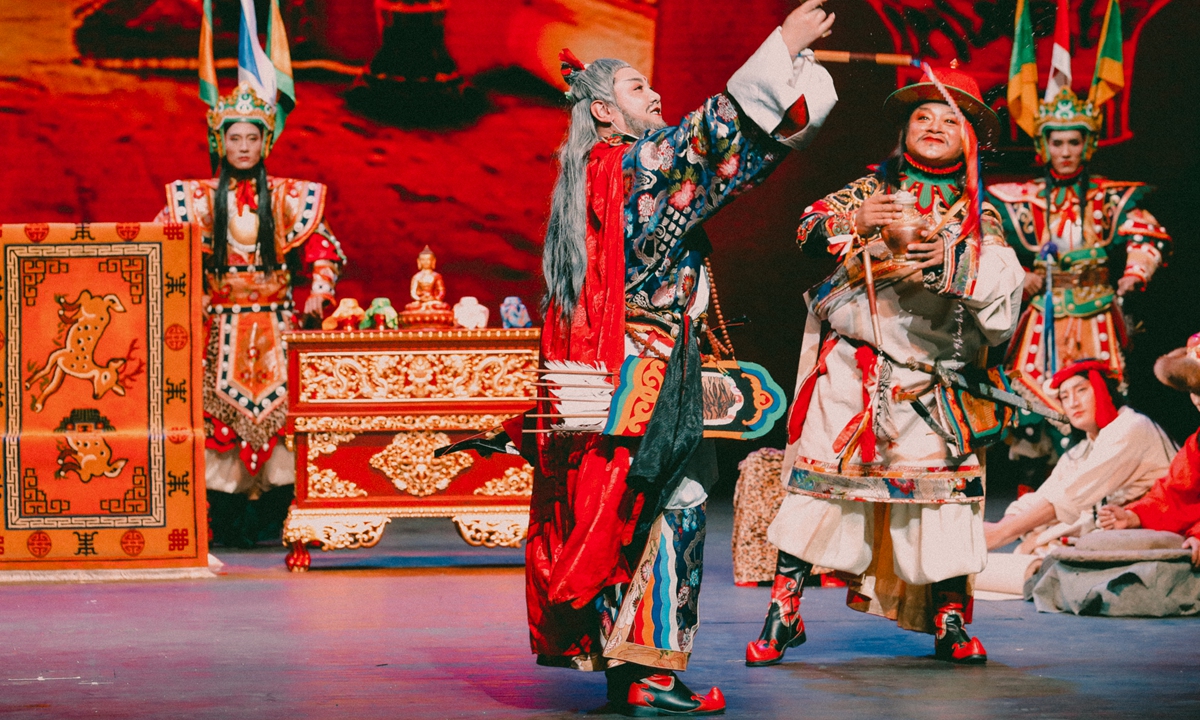
Actors perform the traditional Tibetan Opera Epic of King Gesar. (Photo: Courtesy of China Arts and Entertainment Group)
Tashi Choden village in Lhoka, Southwest China's Xizang Autonomous Region has been listed in the second batch of national-level tourist spots. Known as the "first Tibetan Opera village," it has promoted its inheritance of the most ancient school of Tibetan Opera and Tibetan culture through its rural revitalization program.
Tashi Choden village enjoys a favorable location as it is five kilometers from Khesum village, the first village of Xizang's Democratic Reform in 1959 and Yumbulagang, the first monastery in Tibetan history, which was built in the 2nd century BC. With a convenient means of transportation, it has developed into a tourist village featuring traditional Yarlung Culture.
Tibetan Opera is a comprehensive art form, combining Tibetan myths, legends, folk songs, dance, narration and acrobatics as well as religious music. It is recognized as part of the first batch of national-level cultural heritage and also as UNESCO intangible cultural heritage. Since Tibetan Opera was founded by Thangtong Gyalpo, an eminent monk in Lhoka, the birthplace of Tibetan culture, it has provided Tashi Choden with the advantage of becoming the "first Tibetan Opera village" in Xizang.
Boasting a history of 600 years, the Tashi Shiba School of Tibetan Opera is the oldest school of Tibetan Opera. All actors wear white masks (different from the blue masks in other schools). The operas are generally composed of three parts: the prelude, or Don in Tibetan language; the formal play or Shu; and the conclusion or Tashi. Since the 5th Dalai Lama (1617-1682), the Tashi Shiba School of Tibetan Opera has been prominent at festivals and events such as Tibetan New Year, the Lhasa Shoton Festival, the Wangguo Festival, the Lhoka Cultural Heritage Day, the Yarlung Cultural Festival and Yarlung Commodities Trade and Cultural Exchanges Fair.
In recent years, Tashi Choden village has been engaged in promoting its Tibetan Opera, known as "the living fossil" of Tibetan culture, while revitalizing its rural area. A large-scale Tibetan training school was set up on the village cultural square to introduce the Tashi Shiba School of Tibetan Opera to tourists. It also allows them to experience the unique charm of this ancient art. Efforts have also been made to add to the number of Tibetan Opera plays and improve the quality of the performances.
To promote its Tibetan culture, Tashi Choden village has made great efforts to improve its tourist environment. It has invested more than 50 million yuan ($7.27million) in various renovation projects, including building Tibetan-style home inns, repairing roads, and improving local rivers and canals. The efforts aim to create a more appealing environment for tourists.
The village has also cooperated with some professional tourist companies to attract more firms and product brands to enter the village. In addition, it has launched several travel promotion meetings in Lhasa as well as Wuhan and Hefei in Central China's Hubei and Anhui provinces respectively. Meanwhile, the village has been boosted by the return of more migrant workers to start up businesses and promote its Tibetan Opera culture. It has become a national key model village for rural tourism, drawing more and more tourists from across the country to visit it.


